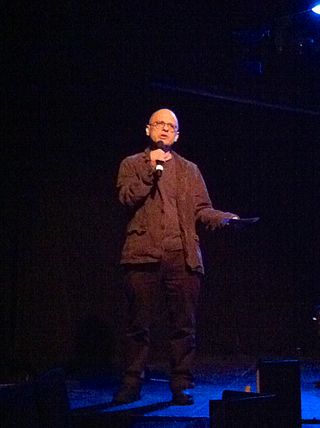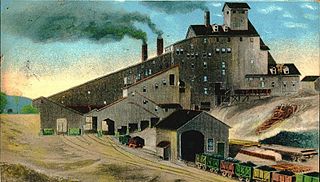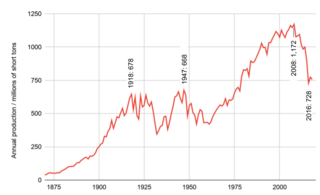
The Pulitzer Prize for Music is one of seven Pulitzer Prizes awarded annually in Letters, Drama, and Music. It was first given in 1943. Joseph Pulitzer arranged for a music scholarship to be awarded each year, and this was eventually converted into a prize: "For a distinguished musical composition of significant dimension by an American that has had its first performance in the United States during the year."

Schuylkill County is a county in the Commonwealth of Pennsylvania. As of the 2020 census, the population was 143,049. The county seat is Pottsville. The county is part of the Northeast Pennsylvania region of the state.

Anthracite, also known as hard coal and black coal, is a hard, compact variety of coal that has a submetallic lustre. It has the highest carbon content, the fewest impurities, and the highest energy density of all types of coal and is the highest ranking of coals.

Julia Wolfe is an American composer and professor of music at New York University. According to The Wall Street Journal, Wolfe's music has "long inhabited a terrain of its own, a place where classical forms are recharged by the repetitive patterns of minimalism and the driving energy of rock". Her work Anthracite Fields, an oratorio for chorus and instruments, was awarded the 2015 Pulitzer Prize for Music. She has also received the Herb Alpert Award (2015) and was named a MacArthur Fellow (2016).

The Molly Maguires was an Irish 19th-century secret society active in Ireland, Liverpool, and parts of the eastern United States, best known for their activism among Irish-American and Irish immigrant coal miners in Pennsylvania. After a series of often violent conflicts, twenty suspected members of the Molly Maguires were convicted of murder and other crimes and were executed by hanging in 1877 and 1878. This history remains part of local Pennsylvania lore and the actual facts are much debated among historians.

The Coal Region is a region of Northeastern Pennsylvania. It is known for being home to the largest known deposits of anthracite coal in the world with an estimated reserve of seven billion short tons.

The Coal strike of 1902 was a strike by the United Mine Workers of America in the anthracite coalfields of eastern Pennsylvania. Miners struck for higher wages, shorter workdays, and the recognition of their union. The strike threatened to shut down the winter fuel supply to major American cities. At that time, residences were typically heated with anthracite or "hard" coal, which produces higher heat value and less smoke than "soft" or bituminous coal.

David Lang is an American composer living in New York City. Co-founder of the musical collective Bang on a Can, he was awarded the 2008 Pulitzer Prize for Music for The Little Match Girl Passion, which went on to win a 2010 Grammy Award for Best Small Ensemble Performance by Paul Hillier and Theatre of Voices. Lang was nominated for an Academy Award for "Simple Song #3" from the film Youth.

A coal breaker is a coal processing plant which breaks coal into various useful sizes. Coal breakers also remove impurities from the coal and deposit them into a culm dump. The coal breaker is a forerunner of the modern coal preparation plant.

Eckley Miners' Village in eastern Pennsylvania is an anthracite coal mining patch town located in Foster Township, Pennsylvania. Since 1970, Eckley has been owned and operated as a museum by the Pennsylvania Historical and Museum Commission.

A breaker boy was a coal-mining worker in the United States and United Kingdom whose job was to separate impurities from coal by hand in a coal breaker.

St. Nicholas Breaker was a historic coal breaker in Schuylkill County, Pennsylvania.

The history of coal mining in the United States starts with the first commercial use in 1701, within the Manakin-Sabot area of Richmond, Virginia. Coal was the dominant power source in the late 1800s and early 1900s, and although in rapid decline it remains a significant source of energy in 2024.
George Korson was a folklorist, journalist, and historian. He has been cited as a pioneer collector of industrial folklore, and according to Michael Taft of the Library of Congress, "may very well be considered the father of occupational folklore studies in the United States." In addition to writing and editing a number of influential books, he also issued his field recordings of coal miners on two LP records for the Library of Congress.
The Avondale Colliery was a coal mine in Plymouth Township, Luzerne County, near Plymouth, Pennsylvania in the small town of Avondale. The mine was considered to be "one of the best and worst" operating in Pennsylvania's Wyoming Valley.

The Avondale Mine disaster was a massive fire at the Avondale Colliery near Plymouth Township, Pennsylvania, on September 6, 1869. It caused the death of 110 workers. It started when the wooden lining of the mine shaft caught fire and ignited the coal breaker built directly overhead. The shaft was the only entrance and exit to the mine, and the fire trapped and suffocated 108 of the workers. It was the greatest mine disaster to that point in American history.

There are two types of coal found in Pennsylvania: anthracite, the hard coal found in Northeastern Pennsylvania below the Allegheny Ridge southwest to Harrisburg, and bituminous, the soft coal found west of the Allegheny Front escarpment). Anthracite coal is a natural mineral with a high carbon and energy content that gives off light and heat produced energy when burned, making it useful as a fuel. It was possibly first used in Pennsylvania as a fuel in 1769, but its history begins with a documented discovery near Summit Hill and the founding of the Lehigh Coal Mine Company in 1792 to periodically send expeditions to the wilderness atop Pisgah Ridge to mine the deposits, mostly with notable lack of great success, over the next 22 years.
Steel Hammer is a 2009 composition for three sopranos and chamber ensemble by the American composer Julia Wolfe. It was first performed on November 21, 2009, at Zankel Hall by the contemporary classical music groups Bang on a Can and Trio Mediæval. The piece is based on the ballad of the African-American tall tale John Henry. The composition was a finalist for the 2010 Pulitzer Prize for Music.
Fire in my mouth is an oratorio for girls' choir, women's choir, and orchestra by the American composer Julia Wolfe. The work was commissioned by the New York Philharmonic under the direction of Jaap van Zweden and was completed in August 2018. Its world premiere was given by the Philadelphia-based chamber choir The Crossing, the Young People’s Chorus of New York City, and the New York Philharmonic led by Jaap van Zweden at David Geffen Hall, New York City, on January 24, 2019.
Her Story is a composition for 10 women's voices and orchestra by the American composer Julia Wolfe. The work was commissioned by a consortium of orchestras including the Boston Symphony Orchestra, Chicago Symphony Orchestra, Nashville Symphony, National Symphony Orchestra, and San Francisco Symphony. Its world premiere was performed by the Nashville Symphony and Lorelei Ensemble conducted by Giancarlo Guerrero at the Schermerhorn Symphony Center on September 15, 2022.















